第一册Unit 4新编实用英语教程第4版高教社教案
- 格式:doc
- 大小:271.50 KB
- 文档页数:8
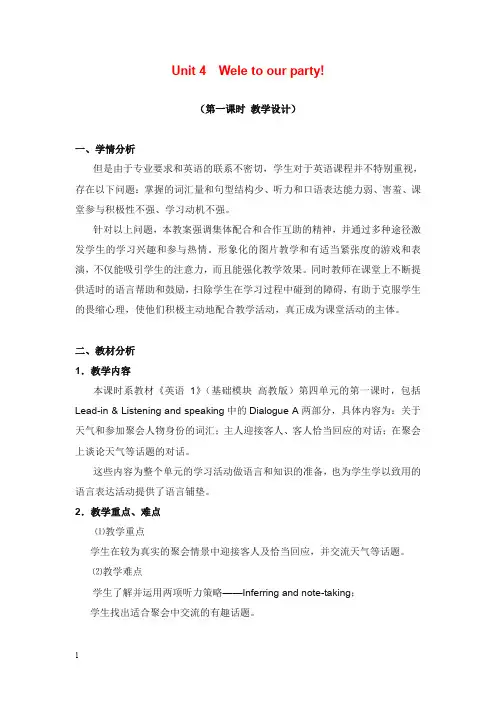
Unit 4 Wele to our party!(第一课时教学设计)一、学情分析但是由于专业要求和英语的联系不密切,学生对于英语课程并不特别重视,存在以下问题:掌握的词汇量和句型结构少、听力和口语表达能力弱、害羞、课堂参与积极性不强、学习动机不强。
针对以上问题,本教案强调集体配合和合作互助的精神,并通过多种途径激发学生的学习兴趣和参与热情。
形象化的图片教学和有适当紧张度的游戏和表演,不仅能吸引学生的注意力,而且能强化教学效果。
同时教师在课堂上不断提供适时的语言帮助和鼓励,扫除学生在学习过程中碰到的障碍,有助于克服学生的畏缩心理,使他们积极主动地配合教学活动,真正成为课堂活动的主体。
二、教材分析1.教学内容本课时系教材《英语1》(基础模块高教版)第四单元的第一课时,包括Lead-in & Listening and speaking中的Dialogue A两部分,具体内容为:关于天气和参加聚会人物身份的词汇;主人迎接客人、客人恰当回应的对话;在聚会上谈论天气等话题的对话。
这些内容为整个单元的学习活动做语言和知识的准备,也为学生学以致用的语言表达活动提供了语言铺垫。
2.教学重点、难点⑴教学重点学生在较为真实的聚会情景中迎接客人及恰当回应,并交流天气等话题。
⑵教学难点学生了解并运用两项听力策略——Inferring and note-taking;学生找出适合聚会中交流的有趣话题。
三、教学目标1. 知识目标⑴学生能掌握部分关于天气和参加聚会人物身份的词汇,如party,weather,season,pleasant,snowy,rainy,windy,sunny,cloudy,foggy,host,guest。
⑵学生能掌握迎接客人及恰当回应、在聚会上谈论天气等话题的句型,如:Wele to our party!This way,please.What’s the weather like in your hometown?It’s ….2. 能力目标⑴学生能在真实聚会情景中迎接客人并恰当回应。


新编实用英语电子教案U n i t4(共28页)-本页仅作为预览文档封面,使用时请删除本页-Unit 4Key and TranslationSECTION ITalking Face to FaceThe topic area of Talking Face to Face in this unit is to make a timetable or a schedule. The focus of functions is on the patterns that are appropriate for making appointments and arranging activities in different situations.Imitating Mini-Talks1 Work in pairs. Look at the pictures and practice the following mini-talks about schedules and timetables.Acting out the Tasks2Work in pairs and act out the tasks by following the above mini-talks.Studying Timetables and Schedules3Timetables and schedules are important in planning our activities. Now let’s read the following timetable and schedule.马克的时间表(2011年6月)Following Sample Dialogues4Read the following sample dialogues and try to perform your own tasks. Putting Language to Use56SECTION II Being All EarsLearning Sentences for Workplace Communication1 Listen to 10 sentences for workplace communication cross-referenced with their Chinese translations.Script:1) Would you please arrange a meeting for me with Dr. Johnson?2) I’d like to make an appointment to see Mr. Black.3) I’d like to confirm our meeting tomorrow afternoon.4) The train is due to arrive at 9 o’clock, but i t has been delayed for one hour.5) I’d like to see yo u tomorrow if you have time.6) I’m wondering if you’d like to come and discuss the new plan in my office.7) I’d like to change the appointment from Tuesday to Wednesday.8) Could we put it off to next week9) Let’s say 3:30 Friday afternoon.10) Please tell me the departure and arrival time.2Listen to the following sentences for workplace communication in Column A and match each one with its Chinese version in Column B.3 Listen to 6 sentences for workplace communication and choose their right responses.Handling a Dialogue4Listen to a dialogue and supply the information by filling in Susan’s schedule.key:March 11, Monday have a meetingMarch 12, Tuesday have dinner with friendsan appointment with Mr. PetersonMarch 13,Wednesdayextra work in the officeMarch 14,ThursdayMarch 15, Friday go to evening classesUnderstanding a Short Speech/Talk5 Now listen to a short tour guide speech and fill up the blanks according to what you have heard. The words in brackets will give you some hints.Script:Hello, everyone. I’m Lily, your tour guide. I’m sure you are excited about today’s tour. The first place we will be visiting is Yonghe Temple. The one-hour temple tour finishes at about 11. Before having lunch at 12, we will pay a short visit to a Tea House to enjoy the tea ceremony. In the afternoon, we will see the old Beijing lanes by taking rickshaws. After that, we will have a one-hour tour of the Beijing Olympic Stadium. You can take pictures at the Bird’s Nest and Water Cube. We will enjoy a Kongfu evening show before coming back to our hotel.6Listen to the speech again and complete the information in Column A with the right choices in Column B.SECTION III Trying Your HandPracticing Applied Writing1 Fill in the office hours by making use of the information in the passage that follows.Writing Sentences and Reviewing Grammar3. He told us he (had) joined the Party in 2010.10. He lived in London until 2010.SECTION IV Maintaining a Sharp EyePassage I Punctuality Pays!Information related to the reading passage Americans and Europeans consider time to be an asset that can be spent and saved; therefore, proper scheduling of time and its appropriate allocation to various competing tasks is an important part of organizational management. Variations in time use are expected to influence performance and stress, as well as other outcomes. It is a vital strategic element. The large amount of management processes and methods developed to improve performance by managing time use proves the importance placed on time. Here are a few famous quotes and sayings about time and punctuality:Do you love life Thus do not squander time, for that’s the stuff life is made of. — Benjamin FranklinTime wastes things away, and all things grow old through time. — Aristotle Time takes all and gives all. — Giordano BrunoLost wealth may be replaced by industry, lost knowledge by study, lost health by temperance or medicine, but lost time is gone for ever. — Samuel SmilesFew things tend more to alienate friendship than a want of punctuality in our engagements. I have known the breach of a promise to dine or sup to break up more than one intimacy. — William HazlittPunctuality is the soul of business. — Thomas Chandler HaliburtonWhile we keep a man waiting, he reflects on our shortcomings. — Anonymous Language Points1Explanation of difficult sentences1. (Para. 1) One of the cultural differences that tend to annoy Americans has todo with understanding of punctuality.Analysis: Has to do with is a phrase meaning has a specified relationship with It is the predicate of the sentence.That introduces a restrictive relative clause modifying differences.Translation: 有一种常会惹恼美国人的文化差异可能关系到对守时的不同理解。
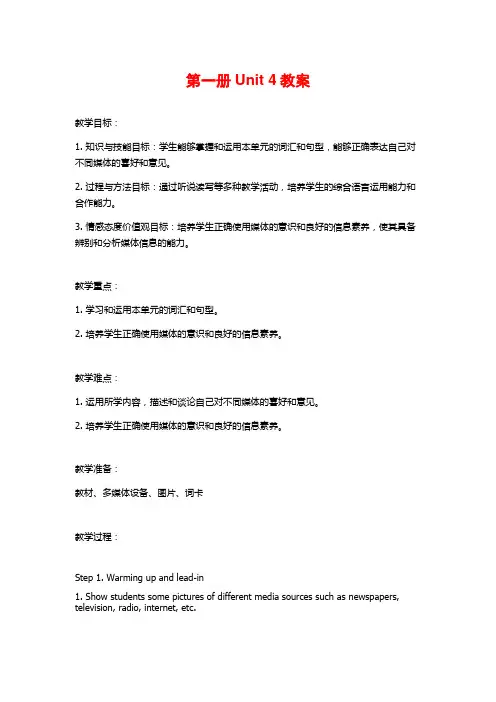
第一册Unit 4教案教学目标:1. 知识与技能目标:学生能够掌握和运用本单元的词汇和句型,能够正确表达自己对不同媒体的喜好和意见。
2. 过程与方法目标:通过听说读写等多种教学活动,培养学生的综合语言运用能力和合作能力。
3. 情感态度价值观目标:培养学生正确使用媒体的意识和良好的信息素养,使其具备辨别和分析媒体信息的能力。
教学重点:1. 学习和运用本单元的词汇和句型。
2. 培养学生正确使用媒体的意识和良好的信息素养。
教学难点:1. 运用所学内容,描述和谈论自己对不同媒体的喜好和意见。
2. 培养学生正确使用媒体的意识和良好的信息素养。
教学准备:教材、多媒体设备、图片、词卡教学过程:Step 1. Warming up and lead-in1. Show students some pictures of different media sources such as newspapers, television, radio, internet, etc.2. Ask students if they like these different types of media and why. Encourage them to use the vocabulary words they have learned (e.g. interesting, informative, entertaining, etc.) to express their opinions.Step 2. Presentation1. Present the new words and phrases of this unit (e.g. TV show, news program, use the internet, radio station, etc.) using pictures, gestures and real objects, and have students repeat after you.2. Introduce the sentence pattern \。
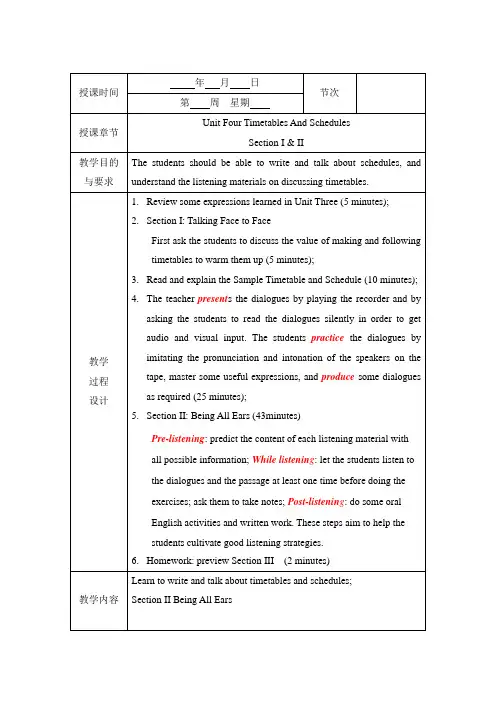
Unit 4 Timetables And SchedulesI. Objectives:By the end of this unit, the students should be able to1) read and discuss timetables and schedules in English,2) learn some expressions used in making timetables and schedules and write theirown timetables and schedules,3) comprehend the two passages and master the useful expressions in them, and4) finish the exercises by themselves or with some help.II. IntroductionLead-in(导入): First, the students are asked to discuss the topic—time. Then their opinions are written down on the blackboard. Finally, the introductory remarks will be made by the teacher as follows:It’s said that time is money. When money is used up, it can be back. However, when time is lost, we never get it back again. Time plays an important role in our life. In addition, time has cultural distinctions, so we should cherish time, and arrange our time properly. Then we need a timetable or schedule. Today we will study how to make timetables and schedules.III. Teaching Procedures:Section I. Talking Face to FaceStep 1. Presentation:Read the following two schedules and timetablesSample 1 Flight TimetableBeijing---Guangzhou---Hong KongNotes:1) a.m.: in the morning2) p.m.: in the afternoon3) Departure: going away4) Arrival: getting to some placeSample 2Mark’s ScheduleApril, 2002Notes:1) sales meeting: a meeting in which you can buy or sell goods just like trade fair.2) General Manager: a person who controls or manages the wholecompany.Step 2.Practice:Dialogue 1 Talking about a Flight TimetableBob is calling a receptionist for information about flights from Beijing to Hong Kong.Receptionist: CAAC information. Can I help you?Bob: Yes .Is there a flight to Hong Kong on Tuesday, the 16th?R: Yes, there is.Bob: Is that a direct flight?R: No you have to change in Guangzhou.Bob: Oh, how long does it stop over in Guangzhou?R: From 11 to 12.Bob: 11 to 12. That’s almost an hour. Well, I prefer a direct flight.R: I’m sorry, but there’s no direct flight on Tuesday.Bob: What about Wednesday, the 17th.R: There’s one on Wednesday, the 17th.Bob: Good. What’s the department time?R: 8:45 a.m. and the arrival time in Hong Kong is 11 in the morning. Notes:1) CAAC: Civil Aviation Administration of China (中国民航总局)2) Direct flight: the flight that can arrive at the destination directly. It’s also called “though flight”3) Change: get off from one flight then get on another oneQuestions:1) Which flight will Bob take?2) When will Bob arrive in Hong Kong by taking this flight?Dialogue 2 Talking about Mark’s ScheduleJoe: Have you been busy recently?Mark: Yes, and I have a busy schedule this week, too. This morning I need to write a business report and this afternoon at 1:30. I’ll discuss the report withthe general manager.Joe: What’s your schedule for tomorrow?Mark: Tomorrow is Tuesday .I’m attending the sales meeting au 8 inthe morning. And in the afternoon at 3 :00 I’m seeing Mr. Black, themarketing manager.Joe: What about Wednesday?Mark: I’ve got an appointment at 8:30 with Mr. Anderson, the bank manager .In the afternoon I’m taking the 4:45 flight to Hong Kong for the conference.Joe: The conference is on Thursday, right?Mark: Oh, yes, at 10:00 in the morning and 2:00 in the afternoon. After the conference, I’ll be free. I’ll be enjoying my weekend in Hong Kong.Joe: When are you coming back?Mark: I’ll take the 2:15 flight back on Friday afternoonQuestions:1) When is the appointment between Mark and Mr. Anderson?2) When will Mark go back?3) What does Mark do?Step 3. Production:Task: Imagine you are Mark. You are telling your friend Jack about your trip to Beijing. The following dialogue is provided for your reference.Jack: Hi, Mark. What’s your plan for this weekend?Mark: I’m going to Beijing.Jack: Oh, how interesting!Mark: I have some friends there and I miss them very much.Jack: I guess your friends will arrange your trip there.Mark: Yes. On Saturday one of my friends will drive me around the city. We’ll have lunch with some friends at noon. In the evening, we’ll go to a concert.Jack: Wonderful! When are you coming back?Mark: On Sunday evening. I am taking an evening flight back.Jack: I hope you have a nice weekend.Section II : Being All Ears(参考电子课件)Dialogue 1:Teaching Procedure (It aims to train the students with proper listening strategies.) Pre-listening: provide the students with the new words and expressions; read through the questions and the chart in exercise 1 and 2, and make somepredictions as to the content of the dialogue.While-listening: ask the students to listen to the dialogue for the first time and ask them just to understand the main idea of the dialogue not to finish theexercises; listen to the dialogue again and ask them to finish exercise 1;ask the students to repeat the dialogue sentence by sentence after the tapewhile the teacher will press the button “pause” on the tape recorder; listento the dialogue as a whole for the last time.Post-listening: ask the students to finish exercise 2, i.e. answering questions. This step aims to change listening to speaking.Notes: The following dialogue and the passage listening can be done in a more or less similar procedure.Section III: Maintaining a Sharp EyePassage 1 Punctuality and Keeping PromiseStep 1.Lead-in (In this step, some related information will be provided for the students.)PunctualityPunctuality is important in social activities because nobody likes to be kept waiting. A punctual person is usually considered reliable and responsible. Lack of punctuality implies that the person does not have consideration for other people’s time.Make an AppointmentMany people schedule their time carefully so it’s polite to make an appointment first if you need to see anybo dy. It’s usually necessary to make a phone call well in advance to make an appointment with a doctor, dentist, lawyer, manger etc. You’d better call off or postpone your appointment if you can’t make it. Try not to break an appointment without a notice in advance.Step prehension Questions (The students will be asked some compression questions after they have skimmed the passage to help them develop reading strategies.)(1)What is emphasized in social activities?(2) How will a foreigner feel if you are late in getting to the airport to meet him?(3) When should the guests come to a social activity?(4) If you are late for a social activity, what should you do?(5) What should you do if you cannot inform the person concerned of the change ofan appointment?Step 3. Explain the passage in detail(1) Explanations of Difficult Sentences①(Para. 1) --how anxious and embarrassed he will be when he, as a strangerto the place, sees no person meeting him!Analysis: This is an exclamatory sentence with when-clause as an adverbial of time. As means “being”, used here to introduce an adverbial of manner. Meeting is a present participial modifying “person”.Translation: 他来到一个陌生的地方,看到没有人来接他,他会是多么焦急和尴尬!Example: How happy and delighted she will be when she, as a foreigner, sees a friend meeting her at the airport.②(Para. 1) --The same is true with the activity of seeing off a foreign guest. Analysis: “The same is true with…”is a sentence pattern which means “…也是如此” in Chinese. “With” is a preposition introducing the kind of thing which has the specific feature(s) mentioned in the previous sentence(s).Translation: 给外国人送行也是如此。
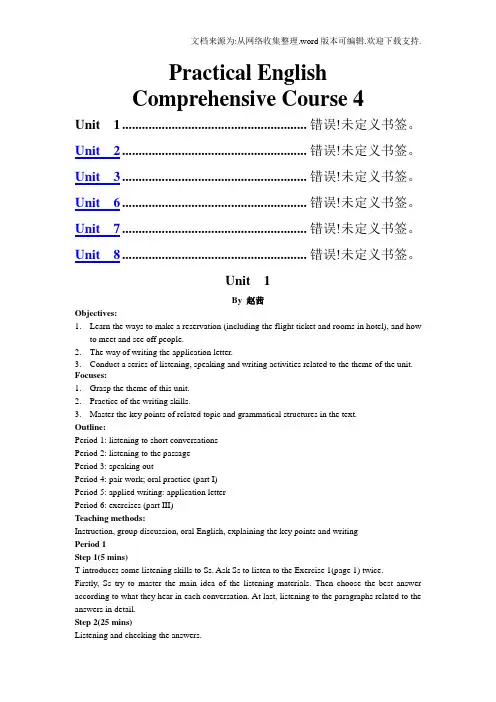
Practical EnglishComprehensive Course 4Unit 1 ........................................................ 错误!未定义书签。
Unit 2........................................................ 错误!未定义书签。
Unit 3........................................................ 错误!未定义书签。
Unit 6........................................................ 错误!未定义书签。
Unit 7........................................................ 错误!未定义书签。
Unit 8........................................................ 错误!未定义书签。
Unit 1By 赵茜Objectives:1.Learn the ways to make a reservation (including the flight ticket and rooms in hotel), and howto meet and see off people.2.The way of writing the application letter.3.Conduct a series of listening, speaking and writing activities related to the theme of the unit. Focuses:1.Grasp the theme of this unit.2.Practice of the writing skills.3.Master the key points of related topic and grammatical structures in the text.Outline:Period 1: listening to short conversationsPeriod 2: listening to the passagePeriod 3: speaking outPeriod 4: pair work; oral practice (part I)Period 5: applied writing: application letterPeriod 6: exercises (part III)Teaching methods:Instruction, group discussion, oral English, explaining the key points and writingPeriod 1Step 1(5 mins)T introduces some listening skills to Ss. Ask Ss to listen to the Exercise 1(page 1) twice. Firstly, Ss try to master the main idea of the listening materials. Then choose the best answer according to what they hear in each conversation. At last, listening to the paragraphs related to the answers in detail.Step 2(25 mins)Listening and checking the answers.Step 3(15mins)T explains some important points of the conversations for Ss. As the following:1)Who is the woman supposed to meet?adj. 假定的, 假像的2)It’s developing at a tremendous speed.Tremendous:巨大的Expression: at a adj. speed3)Generally speaking, it was a smooth one except for a short delay in Tokyo. But it was such a long flight that I really feel exhausted now.Generally speaking: 总的来说smooth:顺利的delay:晚点Exhausted:劳累的4)Attention please. East China Airlines Flight 733 to San Francisco is boarding now at Gate Number 10.Attention please.请注意。
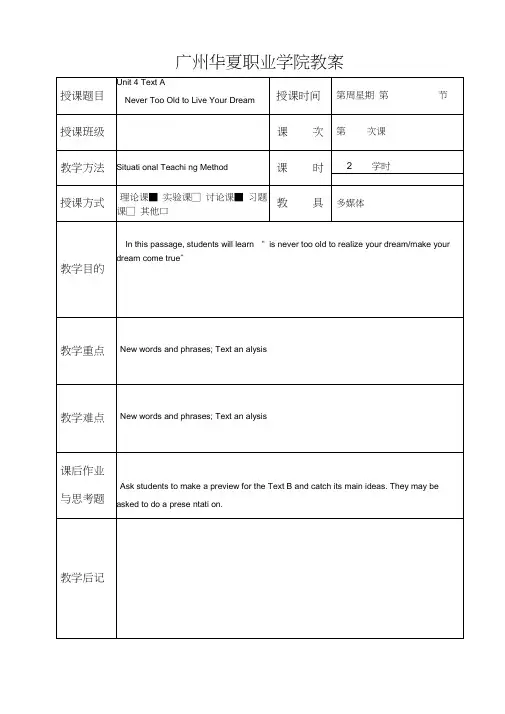
广州华夏职业学院教案广州华夏职业学院教案纸Never Too Old to Live Your DreamStep 1: lead-in part: One Minute Flywatch a short movie and take notes;discuss the following questions with your deskmates.1. What does “ succmeessan”for you? Are you eager for success?2. Do you thi nk “ ef努力;勤奋)is importa nt? Why? And give your reaso ns.and 3. Does “ effort “ will certainly lead to “ success ” ?(关tSre thbetwletions “ effortsuccessStep 2: lead-in part : Useful and Expression1.Beautiful/lovely day, isn 't it?2.It 's a nice/lovely/terrible day, isn 't it?3. Wonderful weather, isn 't it?4. What fine weather we 're having today!5. What 's the weather like/ the weather forecast/the temperature today?6.It ' s sunny/gfyo/gwarm and damp today.7.It looks like rain/a storm.8.We had a strong wind last night.9.It ' s going to clear up.10.I hope it ' ll clear up tomorrow.Step 3: New words and phrases 见PPTAsk students to look these words 'interpretation up in dictionary and catch their main idea. And then teacher lists their Chinese interpretations to check.Step 4: Text Analysis for Para1- 8Never Too Old to Live Your Dream--is never too old to realize your dream/make your dream come true.追求梦想,永远不会太晚Para 1:The first day of school our professor introduced himself and challenged us to get to know someone we didn 't know. I stood up to look around when a gentle hand touched my shoulder. I turned aruond to find a wrinkled, little old lady beaming up at me with a smile that lit up her entire being.Professor 教授,专家;in troduce on eself 介绍… 自己;challe nge 挑战;get to know 了解;look around 环视;gentle 温柔的,绅士的;turn around 回过头,转过身;wrinkled 有皱纹的;广州华夏职业学院教案纸beam at sb对着某人;lit up [light up]点燃;变快活;her entire being她整个人译文:开学的第一天教授做了自我介绍,他还要求我们去结识某位我们还不认识的人。
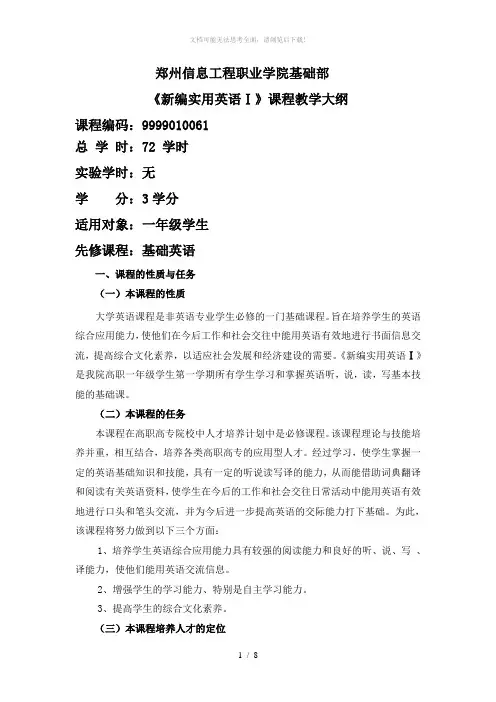
郑州信息工程职业学院基础部《新编实用英语Ⅰ》课程教学大纲课程编码:9999010061总学时:72 学时实验学时:无学分:3学分适用对象:一年级学生先修课程:基础英语一、课程的性质与任务(一)本课程的性质大学英语课程是非英语专业学生必修的一门基础课程。
旨在培养学生的英语综合应用能力,使他们在今后工作和社会交往中能用英语有效地进行书面信息交流,提高综合文化素养,以适应社会发展和经济建设的需要。
《新编实用英语Ⅰ》是我院高职一年级学生第一学期所有学生学习和掌握英语听,说,读,写基本技能的基础课。
(二)本课程的任务本课程在高职高专院校中人才培养计划中是必修课程。
该课程理论与技能培养并重,相互结合,培养各类高职高专的应用型人才。
经过学习,使学生掌握一定的英语基础知识和技能,具有一定的听说读写译的能力,从而能借助词典翻译和阅读有关英语资料,使学生在今后的工作和社会交往日常活动中能用英语有效地进行口头和笔头交流,并为今后进一步提高英语的交际能力打下基础。
为此,该课程将努力做到以下三个方面:1、培养学生英语综合应用能力具有较强的阅读能力和良好的听、说、写、译能力,使他们能用英语交流信息。
2、增强学生的学习能力、特别是自主学习能力。
3、提高学生的综合文化素养。
(三)本课程培养人才的定位该课程是我院各专业学生必修的一门公共基础课程,旨在培养学生的英语综合应用能力(听、说、读、写、译);培养学生使用英语处理日常和涉外业务活动能力。
使他们在今后工作中与社会交往中能用英语有效地进行信息交流,提高综合文化素养,以适应社会发展日益国际化的需要。
(四)本课程在人才培养过程中的作用经过本课程的学习,使学生扎实语音、语法、词汇和基本句型等语言基本功,强化并提高听、说、读、写、译的综合能力,提高学生就业竞争力。
二、课程的基本要求通过学习本课程,学生应该达到以下要求:1、词汇认知 2500 个英语单词(包括入学时要求掌握的 1000 个词) 以及由这些词构成的常用词组,对其中 1500个左右的单词能正确拼写,能进行英汉互译。
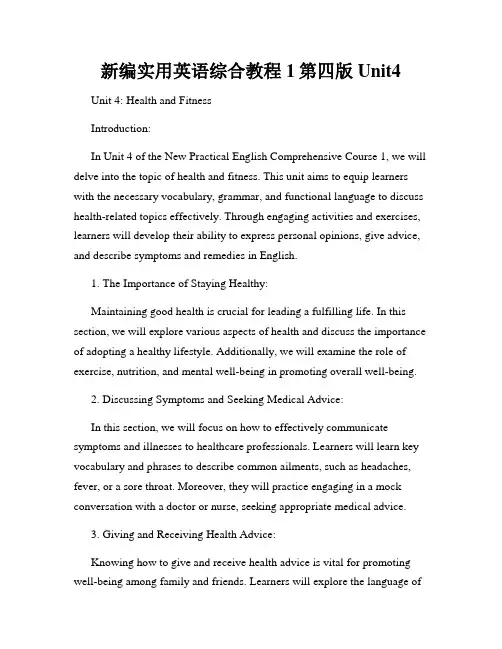
新编实用英语综合教程1第四版Unit4Unit 4: Health and FitnessIntroduction:In Unit 4 of the New Practical English Comprehensive Course 1, we will delve into the topic of health and fitness. This unit aims to equip learners with the necessary vocabulary, grammar, and functional language to discuss health-related topics effectively. Through engaging activities and exercises, learners will develop their ability to express personal opinions, give advice, and describe symptoms and remedies in English.1. The Importance of Staying Healthy:Maintaining good health is crucial for leading a fulfilling life. In this section, we will explore various aspects of health and discuss the importance of adopting a healthy lifestyle. Additionally, we will examine the role of exercise, nutrition, and mental well-being in promoting overall well-being.2. Discussing Symptoms and Seeking Medical Advice:In this section, we will focus on how to effectively communicate symptoms and illnesses to healthcare professionals. Learners will learn key vocabulary and phrases to describe common ailments, such as headaches, fever, or a sore throat. Moreover, they will practice engaging in a mock conversation with a doctor or nurse, seeking appropriate medical advice.3. Giving and Receiving Health Advice:Knowing how to give and receive health advice is vital for promoting well-being among family and friends. Learners will explore the language ofadvice and practice providing suggestions on various health-related topics. They will also learn how to respond to advice and engage in discussions about potential lifestyle changes.4. Making Healthy Choices:In this section, learners will develop their abilities to express personal preferences and make informed choices regarding health. By exploring different types of diets, exercise routines, and healthy habits, they will be able to discuss their own choices and explain their reasons behind them. Additionally, learners will engage in group discussions on controversial health topics and learn how to present their arguments persuasively.5. Healthy Living in the Modern World:The final section of this unit takes a closer look at the impact of modern technology on health and fitness. Learners will examine the pros and cons of various health-related apps, fitness trackers, and online resources. They will also discuss the potential risks of excessive screen time and explore ways to maintain a healthy balance between technology use and physical well-being.Conclusion:Unit 4 of the New Practical English Comprehensive Course 1 provides learners with essential language skills and knowledge to effectively discuss health and fitness in English. By grasping the vocabulary, grammar, and functional language related to health, learners will be better equipped to lead healthy lives and engage in meaningful conversations about well-being.。
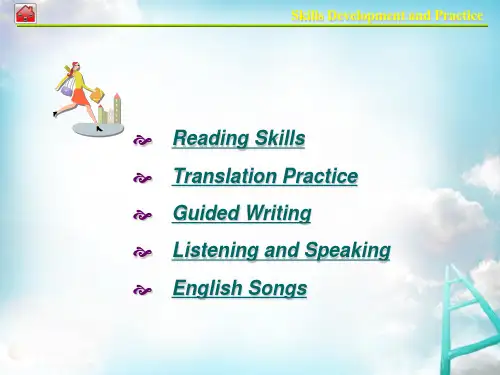
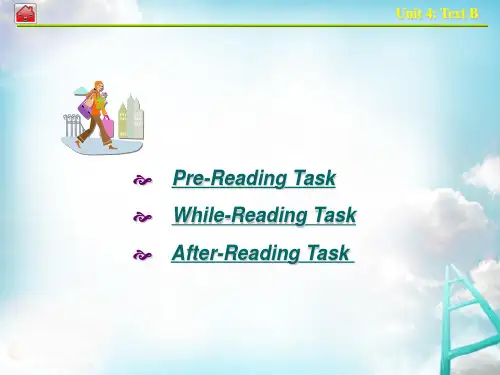
Unit Four Punctuality and CultureUnit Goals:What You Should Learn to Do1. Make / keep / postpone an appointment accordingto a work timetable2. Make reservations according to the timetables offlights and trains3. Understand and make up schedules for differentpurposes4. Write:a timetablea scheduleWhat You Should Know About1. Punctuality in social activities2. Planning a work day / week3. Use of verb tensesSection ⅠTalking Face to FaceImitating Mini-TalksActing out the TasksStudying Timetables and SchedulesFollowing Sample DialoguesPutting Language to UseImitating Mini-Talks1 Work in pairs. Practice the following mini-talks about schedules and timetables.1) Asking for an Appointment with the ManagerA: I'd like to make an appointment with your manager. Do youthink I could see him sometime this morning?B: Sorry, he's fully booked this morning.A: How about tomorrow morning then?B: Yes, I think tomorrow morning would be fine.2) Asking to Meet Mr. PetersonA: Mr. Peterson, I wonder if it would be convenient to meet youtoday.B: Let me see. I'm free this afternoon. Is that all right for you?A: Well, I've got a meeting from 2 to 4. Are you free tomorrowmorning?B: No problem. Let's make it at 10 then.3) Asking to Change the Appointment with Dr. JohnsonA: I'd like to change the appointment with Dr. Johnson fromTuesday to Thursday.B: I'm afraid he won't be available on Thursday morning.A: What time would be convenient for him? Will 2 p.m. do?B: Yes, that'll be fine.4) Asking About the Working Hours of a Ticket OfficeA: What are the office hours?B: Well, the office hours are from 9 a.m. to 6 p.m.A: Do you work on weekends?B: On Saturday the office is open from 9 a.m. to 3 p.m., but on Sunday we are closed.5) Asking About the Flights for MacaoA: Do you have flights to Macao?B: We have only one flight to Macao each week, at 1:40 p.m.Wednesday.A: When does it arrive in Macao?B: At 3:40 p.m.2 Work in pairs and act out the tasks by following the above mini-talks.1 Task:Look at the flight timetable in Exercise 3.Ask about the departure and arrival time2 Task:Look at the flight timetable in Exercise 3.Ask about the Tuesday flight for Hong Kong3 Task:Look at Mark's schedule in Exercise 3.Call to ask Mark for a change of an appointment.4 Task:Look at Mark's schedule in Exercise 3.Ask to make an appointment to see Mark on Wednesday.5 Task:Look at Mark's schedule in Exercise 3.An old friend in Hong Kong asks to see Mark on Thursday.Studying Timetables and SchedulesRead the following sample dialogues and try to perform your own tasks. Putting Language to UseSpeak and CompleteMark: Miss Wang, I want to 1 __________ an evening train to Harbin so thatI can get there the next morning. Do you know the schedule?Miss Wang: Yes. I have got a 2 __________________ here.Mark: Is there a train leaving around 6?Miss Wang: 3 ______________ one at 6:15.Mark: When will it get there?Miss Wang: 4 ______________ at about 8 next morning.Mark: That's the one I need. Thank you very much.Miss Wang: You are 5 ______________.SECTION II Being All EarsLearning Sentences for Workplace CommunicationHandling a DialogueUnderstanding a Short Speech / TalkLearning Sentences for Workplace Communication1 Listen to 10 sentences for workplace communication cross-referenced withtheir Chinese translations.arrange 安排confirm 确认due 规定(到达) 的delay 耽搁2 Listen to the following sentences for workplace communication in Column A andmatch each one with its Chinese version in Column BKey:1-i, 2-j, 3-d, 4-c, 5-f, 6-e, 7-h, 8-g, 9-a, 10-b3 Listen to 6 sentences for workplace communication and choose their right responses4 Listen to a dialogue and decode the message by filling in Susan's scheduleaccording to what you have heard.5 Now listen to a short speech / talk and fill up the blanks according to what youhave heard. The words in brackets will give you some hints.6 Listen to the speech / talk again and complete the information in Column A withthe right choices in Column B.SECTION III Trying Your HandPracticing Applied WritingWriting Sentences and Reviewing Grammar1 Fill in the office hours making use of the information in the passage that follows.2 Translate the following schedule into English, using the data bank in theWorkbook for reference.Writing Sentences and Reviewing Grammar3 Complete the following sentences, using the right verb forms4 Correct the errors in the following sentences.5 Translate the following sentences into English6 Suppose this is your schedule for the coming three days. Write a paragraph ofabout 100 words based on the information given in the schedule. You maystart the passage with the sentence: I've got a very busy schedule.KEYS: I've got a very busy schedule. I'm catching the 9:45 flight on October 8 and arriving in Shanghai at 2:00 in the afternoon. Bob is meeting me at the airport. I will check into Beach Hotel and have a rest there in the evening. On October 9, I'm meeting Mrs. Black at 10:15 a.m. and after having lunch at Beach Hotel we're visiting the plant at 2:30 p.m. The next day I'm attending a conference at 9 a.m. I'm leaving Shanghai in the afternoon. I'm taking a flight at 3:30 p.m. and arriving back at 7:45 p.m. Phillip will be there to pick me up at the airport.SECTION IV Maintaining a Sharp EyeInformation Related to the Reading PassageAmericans and Europeans consider time to be an asset that can be spent and saved; therefore, proper scheduling of time and its appropriate allocation to various competing tasks is an important part of organizational management. Variations in time use are expected to influence performance and stress, as well as other outcomes. It is a vital strategic element. The large amount of management processes and methods developed to improve performance by managing time use proves the importance placed on time. Here are a few famous quotes and sayings about time and punctuality:1 Explanation of Difficult Sentences1. (Para. 1) One of the cultural differences that tend to annoy Americans has to dowith understanding of punctuality.Analysis: Has to do with is a phrase meaning has a specified relationship with.It is the predicate of the sentence. That introduces a restrictive relativeclause modifying differences.Translation:有一种常会惹恼美国人的文化差异可能关系到对守时的不同理解。
新编实用英语综合教程第4册课程设计一、教学目标本教程旨在让学生掌握以下能力:1.能够流畅地阅读和理解英文文章,包括但不限于新闻报道、广告、简报、小说等2.能够正确地使用英文口语进行日常交流和商务沟通3.能够运用所学知识点进行紧密联系的英文写作,如电子邮件、报告、简历等4.能够理解和掌握一定数量的英文语法规则和句型结构二、教学内容本课程共分为五个单元,分别为:1. 商务谈判技巧该单元主要介绍商务谈判常用的英文表达方式和交流技巧,包括但不限于电话沟通、会议交流、邮件沟通等。
2. 社交场合礼仪该单元主要介绍在社交场合如何运用英文礼仪,如面试时的自我介绍、年会时的致辞等。
3. 新闻报道阅读该单元主要介绍新闻报道的英文阅读,目的是让学生能够正确理解新闻报道中的信息和事件。
4. 广告宣传英语该单元主要介绍广告宣传英语的写作和口语表达技巧,让学生了解广告的特点和营销策略。
5. 文学精品赏析该单元主要介绍英文小说、散文和诗歌的欣赏和理解,让学生领略英文文学的魅力。
三、教学方法本课程采用多种教学方法,包括但不限于:1.授课:老师通过讲述知识点的方式向学生传授知识;2.讨论:学生以小组为单位,讨论特定话题,交换意见和观点;3.作业:老师布置书面作业,让学生对所学知识进行巩固和应用;4.模拟演练:通过一些实际场景的模拟演示,让学生亲身体验所学知识的运用;5.课外阅读:鼓励学生通过阅读英文杂志、英文网站和英文书籍等方式,拓展英文知识面和阅读能力。
四、教学评价为了全面了解学生的学习状况和掌握情况,本课程采用以下几种教学评价方式:1.课堂表现:老师通过观察学生的课堂表现、提问和互动情况等,对学生进行综合评价;2.书面作业:老师对学生的书面作业进行批改,评价学生的英文写作水平和句型运用能力;3.口头表达:通过学生的口语表达和演讲能力等,对学生的口语能力进行评价;4.考试评价:本课程将设置中期考试和期末考试,考查学生对所学知识的掌握情况。
《新编实用英语》第 4 教案课题Unit 1 Hello, Hi!课时 2目的要求(知识目标、能力目标、素质目标) Teaching objectives:1) Grasp the main idea and structure of the passage 2 ;2) Master the key language points and grammatical structures in the text;3) Practicing applied writing4) Master the grammar of Subject-Verb Concord教学重点与难点Teaching focuses:1) the main idea of the passage II;2) Master the grammar of Subject-Verb Concord3) Appreciating Culture Tips课堂整体设计思路Teaching procedures: Step 1 lead inStep 2 readingStep 3 writingStep 4 grammar Step 5 homework教学反思教学过程教法学法及时间分配Teaching procedures:Step 1 lead inGreet Ss as usual.Q: How was your holiday?Where have you been?Could you tell us something about your holiday?Step 2 reading1) Appreciating culture tips.Watch some pictures and read some stories.2) Grasp the main idea and structure of the passage 2Conduct exercises of passage 2Step 3 Writing1.Read the following two samples of Business Cards and learn to write your own.2.Translate the following business card into Chinese, using the data bank in the Workbook for reference.Binhai Electronics Ltd.Li TiegangSoftware Dept. Manager / Electronic EngineerAddress: No. 50 Chang Jiang Street, Binhai CityTel.: 0411-4673XXXXFax: 0411-4708XXXXPost code: 116023E-mail: ltg6@3 Write an English business card according to the information given in Chinese.4 Fill in the passport with your own personal information, using the data5 minutes Introduction30 minutes reading20 minutes Writing and questioningbank.Step 4 Grammar1.Analyze the following sentences to see which pattern they belong to.1) Both men speak loudly and clearly.2) An introduction usually includes a greeting and a handshake.3) My e-mail address is lin@.4) They will just wave goodbye to the whole group.5) Our department head will give a dinner to welcome you.6) You could simply call me Wang.7) In her bag there is a passport and a pen.2.Correct the errors in the following sentences.1)The manager for them prepares some beautiful gifts.2) Could you tell to me something about their cultural background?3) Mr. Wang has left in their mind a deep impression.4) Do they always wave to you goodbye in an informal way?5) There are always some people talk happily in the park.3.Translate the following sentences into English.1)我们经常为我们的外国朋友准备一些中国食品。
Unit Four Punctuality and CultureUnit Goals:What You Should Learn to Do1. Make / keep / postpone an appointment accordingto a work timetable2. Make reservations according to the timetables offlights and trains3. Understand and make up schedules for differentpurposes4. Write:a timetablea scheduleWhat You Should Know About1. Punctuality in social activities2. Planning a work day / week3. Use of verb tensesSection ⅠTalking Face to FaceImitating Mini-TalksActing out the TasksStudying Timetables and SchedulesFollowing Sample DialoguesPutting Language to UseImitating Mini-Talks1 Work in pairs. Practice the following mini-talks about schedules and timetables.1) Asking for an Appointment with the ManagerA: I'd like to make an appointment with your manager. Do youthink I could see him sometime this morning?B: Sorry, he's fully booked this morning.A: How about tomorrow morning then?B: Yes, I think tomorrow morning would be fine.2) Asking to Meet Mr. PetersonA: Mr. Peterson, I wonder if it would be convenient to meet youtoday.B: Let me see. I'm free this afternoon. Is that all right for you?A: Well, I've got a meeting from 2 to 4. Are you free tomorrowmorning?B: No problem. Let's make it at 10 then.3) Asking to Change the Appointment with Dr. JohnsonA: I'd like to change the appointment with Dr. Johnson fromTuesday to Thursday.B: I'm afraid he won't be available on Thursday morning.A: What time would be convenient for him? Will 2 p.m. do?B: Yes, that'll be fine.4) Asking About the Working Hours of a Ticket OfficeA: What are the office hours?B: Well, the office hours are from 9 a.m. to 6 p.m.A: Do you work on weekends?B: On Saturday the office is open from 9 a.m. to 3 p.m., but on Sunday we are closed.5) Asking About the Flights for MacaoA: Do you have flights to Macao?B: We have only one flight to Macao each week, at 1:40 p.m.Wednesday.A: When does it arrive in Macao?B: At 3:40 p.m.2 Work in pairs and act out the tasks by following the above mini-talks.1 Task:Look at the flight timetable in Exercise 3.Ask about the departure and arrival time2 Task:Look at the flight timetable in Exercise 3.Ask about the Tuesday flight for Hong Kong3 Task:Look at Mark's schedule in Exercise 3.Call to ask Mark for a change of an appointment.4 Task:Look at Mark's schedule in Exercise 3.Ask to make an appointment to see Mark on Wednesday.5 Task:Look at Mark's schedule in Exercise 3.An old friend in Hong Kong asks to see Mark on Thursday.Studying Timetables and SchedulesRead the following sample dialogues and try to perform your own tasks.Putting Language to UseSpeak and CompleteMark: Miss Wang, I want to 1 __________ an evening train to Harbin so thatI can get there the next morning. Do you know the schedule?Miss Wang: Yes. I have got a 2 __________________ here.Mark: Is there a train leaving around 6?Miss Wang: 3 ______________ one at 6:15.Mark: When will it get there?Miss Wang: 4 ______________ at about 8 next morning.Mark: That's the one I need. Thank you very much.Miss Wang: You are 5 ______________.SECTION II Being All EarsLearning Sentences for Workplace CommunicationHandling a DialogueUnderstanding a Short Speech / TalkLearning Sentences for Workplace Communication1 Listen to 10 sentences for workplace communication cross-referenced withtheir Chinese translations.arrange 安排confirm 确认due 规定(到达) 的delay 耽搁2 Listen to the following sentences for workplace communication in Column A andmatch each one with its Chinese version in Column BKey:1-i, 2-j, 3-d, 4-c, 5-f, 6-e, 7-h, 8-g, 9-a, 10-b3 Listen to 6 sentences for workplace communication and choose their right responses4 Listen to a dialogue and decode the message by filling in Susan's scheduleaccording to what you have heard.5 Now listen to a short speech / talk and fill up the blanks according to what youhave heard. The words in brackets will give you some hints.6 Listen to the speech / talk again and complete the information in Column A withthe right choices in Column B.SECTION III Trying Your HandPracticing Applied WritingWriting Sentences and Reviewing Grammar1 Fill in the office hours making use of the information in the passage that follows.2 Translate the following schedule into English, using the data bank in theWorkbook for reference.Writing Sentences and Reviewing Grammar3 Complete the following sentences, using the right verb forms4 Correct the errors in the following sentences.5 Translate the following sentences into English6 Suppose this is your schedule for the coming three days. Write a paragraph ofabout 100 words based on the information given in the schedule. You maystart the passage with the sentence: I've got a very busy schedule.KEYS: I've got a very busy schedule. I'm catching the 9:45 flight on October 8 and arriving in Shanghai at 2:00 in the afternoon. Bob is meeting me at the airport. I will check into Beach Hotel and have a rest there in the evening. On October 9, I'm meeting Mrs. Black at 10:15 a.m. and after having lunch at Beach Hotel we're visiting the plant at 2:30 p.m. The next day I'm attending a conference at 9 a.m. I'm leaving Shanghai in the afternoon. I'm taking a flight at 3:30 p.m. and arriving back at 7:45 p.m. Phillip will be there to pick me up at the airport.SECTION IV Maintaining a Sharp EyeInformation Related to the Reading PassageAmericans and Europeans consider time to be an asset that can be spent and saved; therefore, proper scheduling of time and its appropriate allocation to various competing tasks is an important part of organizational management. Variations in time use are expected to influence performance and stress, as well as other outcomes. It is a vital strategic element. Thelarge amount of management processes and methods developed to improve performance by managing time use proves the importance placed on time. Here are a few famous quotes and sayings about time and punctuality:1 Explanation of Difficult Sentences1. (Para. 1) One of the cultural differences that tend to annoy Americans has to dowith understanding of punctuality.Analysis: Has to do with is a phrase meaning has a specified relationship with.It is the predicate of the sentence. That introduces a restrictive relativeclause modifying differences.Translation:有一种常会惹恼美国人的文化差异可能关系到对守时的不同理解。